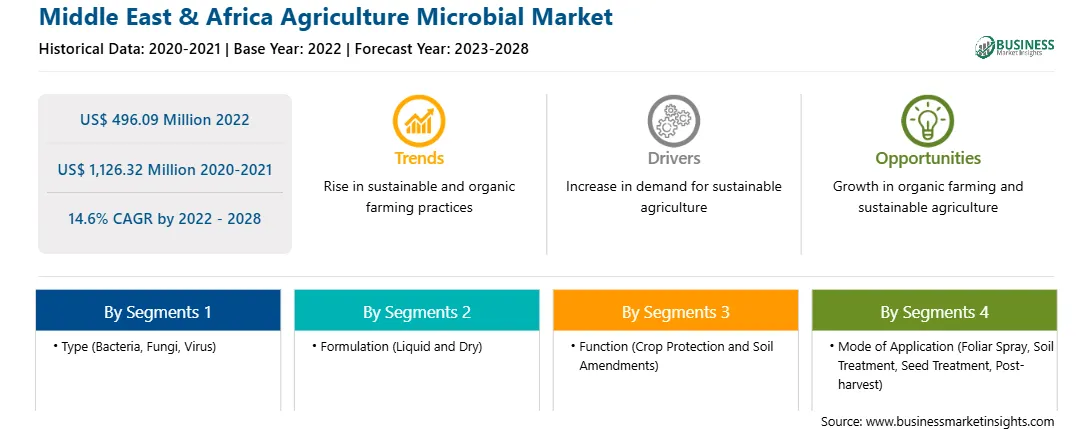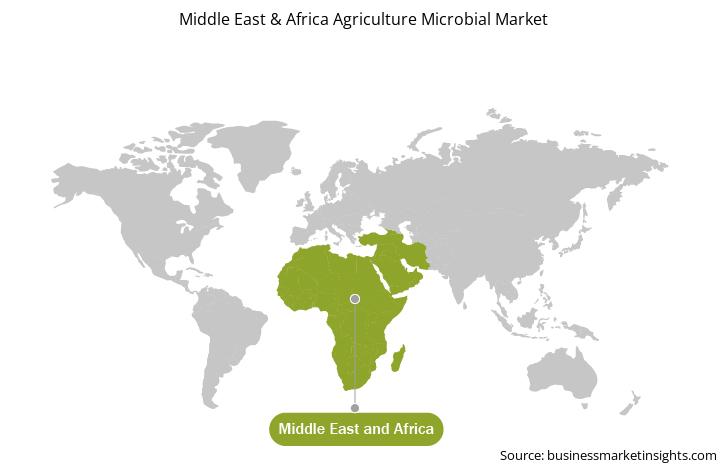Rise in Adoption of Organic Farming
Over the past years, organic farming has been adopted Middle East & Africa, achieving sustainability and lowering the harmful environmental impact. Some benefits of organic farming are reduced soil erosion, decreased nitrate leaching into groundwater and surface water, and recycling of animal waste back into farms. Increased awareness about the benefits has surged the demand for organic agriculture practice. Several governments in developing economies have started to emphasize on adopting organic farming, due to which, the acceptance of agriculture microbial products has increased regionally. Agriculture microbes play a vital role in organic farming for soil management, as synthetic components cannot replace them. Soil microbes, such as bacteria, fungi, viruses, and others, perform a fundamental function in the soil, such as breaking down crop residues and cycling of crucial nutrients, including nitrogen and carbon, and stimulating plant growth. Therefore, the increased adoption of organic farming is expected to surge the demand for agriculture microbial products due to their benefits in organic farming over the next few years. Moreover, consumers are shifting their preference toward the uptake of organic food products due to their desire to avoid genetically engineered organisms and growing environmental concerns. The rising demand for organic food products will, in turn, aid the market in the coming years. These factors are expected to boost the demand for natural plant growth regulators and crop protection products during the forecast period. Thus, the potential growth of organic agriculture practice is expected to surge the demand for agriculture microbial products in the near future.
Market Overview
The Middle East & Africa agriculture microbial market is segmented into South Africa, Saudi Arabia, the UAE, and the Rest of Middle East & Africa. The Middle East & Africa market is one of the emerging agricultural microbial markets as it is replacing and reducing synthetic agrochemicals and rising adoption of sustainable agriculture and organic farming. Governments of various countries in the region are taking initiatives to boost the sustainable agriculture practice to meet the growing food demand. For instance, in June 2022, the National Strategy for Sustainable Agriculture was introduced by the UAE Cabinet to increase the efficiency of farms, reduce water usage for irrigation, and increase self-sufficiency for certain agricultural crops. In recent years, organic agriculture has been adopted in various countries in the Middle East & Africa owing to rising awareness about the benefits offered by organic farming. They are improving soil and water quality, promoting pest regulation, reducing pesticide exposure, protecting biodiversity, and enhancing nutrient recycling. Thus, the increased demand for sustainable agriculture to maintain food security in the region has increased the adoption of agriculture microbial, which is boosting the demand for agriculture microbial.

Strategic insights for the Middle East & Africa Agriculture Microbial provides data-driven analysis of the industry landscape, including current trends, key players, and regional nuances. These insights offer actionable recommendations, enabling readers to differentiate themselves from competitors by identifying untapped segments or developing unique value propositions. Leveraging data analytics, these insights help industry players anticipate the market shifts, whether investors, manufacturers, or other stakeholders. A future-oriented perspective is essential, helping stakeholders anticipate market shifts and position themselves for long-term success in this dynamic region. Ultimately, effective strategic insights empower readers to make informed decisions that drive profitability and achieve their business objectives within the market.

| Report Attribute | Details |
|---|---|
| Market size in 2022 | US$ 496.09 Million |
| Market Size by 2028 | US$ 1,126.32 Million |
| Global CAGR (2022 - 2028) | 14.6% |
| Historical Data | 2020-2021 |
| Forecast period | 2023-2028 |
| Segments Covered |
By Type
|
| Regions and Countries Covered | Middle East and Africa
|
| Market leaders and key company profiles |
The geographic scope of the Middle East & Africa Agriculture Microbial refers to the specific areas in which a business operates and competes. Understanding local distinctions, such as diverse consumer preferences (e.g., demand for specific plug types or battery backup durations), varying economic conditions, and regulatory environments, is crucial for tailoring strategies to specific markets. Businesses can expand their reach by identifying underserved areas or adapting their offerings to meet local demands. A clear market focus allows for more effective resource allocation, targeted marketing campaigns, and better positioning against local competitors, ultimately driving growth in those targeted areas.

Middle East & Africa Agriculture Microbial Market Segmentation
The Middle East & Africa Agriculture Microbial Market is segmented into type, formulation, function, mode of application, and crop type and country.
Based on type, the market is segmented into bacteria, fungi, virus, and others. The bacteria segment registered the larger market share in 2022. Based on formulation , the market is segmented into liquid and dry. The liquid segment held the larger market share in 2022. Based on function, the market is segmented into crop protection and soil amendments. The crop protection segment held the larger market share in 2022. Based on mode of application, the market is segmented into foliar spray, soil treatment, seed treatment, and post-harvest. The foliar spray segment held the largest market share in 2022. Based on crop type, the market is segmented into cereals and grains, oilseeds and pulses, fruits and vegetables, and others .The fruits and vegetables segment held the largest market share in 2022. Based on country, the market is segmented into Saudi Arabia, UAE, South Africa, and Rest of Middle East and Africa. Rest of Middle East & Africa dominated the market share in 2022. BASF SE; Bayer AG; Certis USA LLC; Bio Works; Novozymes A/S; Chr. Hansen Holding A/S; Syngenta Group; Nufarm; and Koppert B.V are the leading companies operating in the agriculture microbial in the region.
The Middle East & Africa Agriculture Microbial Market is valued at US$ 496.09 Million in 2022, it is projected to reach US$ 1,126.32 Million by 2028.
As per our report Middle East & Africa Agriculture Microbial Market, the market size is valued at US$ 496.09 Million in 2022, projecting it to reach US$ 1,126.32 Million by 2028. This translates to a CAGR of approximately 14.6% during the forecast period.
The Middle East & Africa Agriculture Microbial Market report typically cover these key segments-
The historic period, base year, and forecast period can vary slightly depending on the specific market research report. However, for the Middle East & Africa Agriculture Microbial Market report:
The Middle East & Africa Agriculture Microbial Market is populated by several key players, each contributing to its growth and innovation. Some of the major players include:
The Middle East & Africa Agriculture Microbial Market report is valuable for diverse stakeholders, including:
Essentially, anyone involved in or considering involvement in the Middle East & Africa Agriculture Microbial Market value chain can benefit from the information contained in a comprehensive market report.